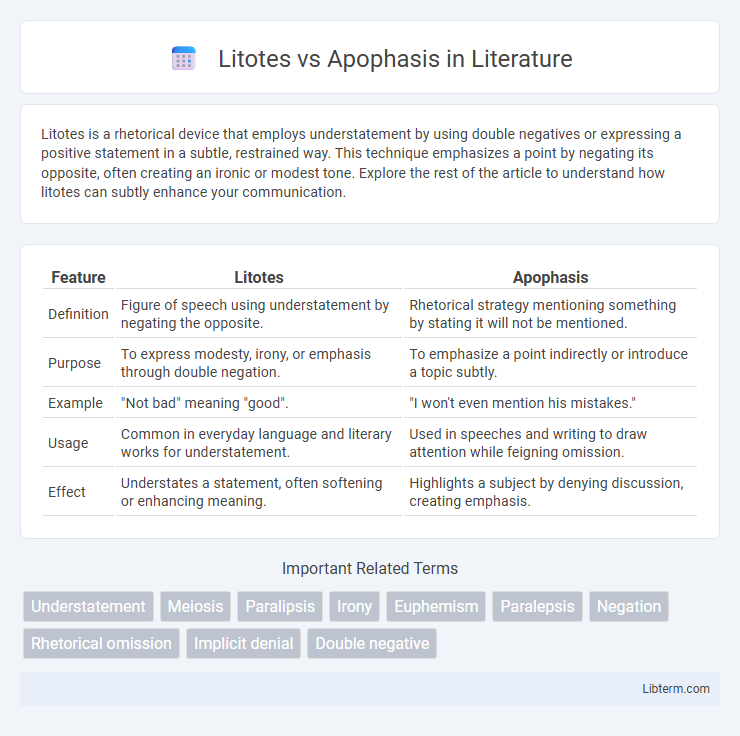Litotes is a rhetorical device that employs understatement by using double negatives or expressing a positive statement in a subtle, restrained way. This technique emphasizes a point by negating its opposite, often creating an ironic or modest tone. Explore the rest of the article to understand how litotes can subtly enhance your communication.
Table of Comparison
| Feature | Litotes | Apophasis |
|---|---|---|
| Definition | Figure of speech using understatement by negating the opposite. | Rhetorical strategy mentioning something by stating it will not be mentioned. |
| Purpose | To express modesty, irony, or emphasis through double negation. | To emphasize a point indirectly or introduce a topic subtly. |
| Example | "Not bad" meaning "good". | "I won't even mention his mistakes." |
| Usage | Common in everyday language and literary works for understatement. | Used in speeches and writing to draw attention while feigning omission. |
| Effect | Understates a statement, often softening or enhancing meaning. | Highlights a subject by denying discussion, creating emphasis. |
Introduction to Litotes and Apophasis
Litotes is a rhetorical figure of speech that employs understatement by using double negatives or negation to emphasize a positive statement, such as saying "not bad" to mean "good." Apophasis, in contrast, involves mentioning something by stating that it will not be mentioned, effectively drawing attention through denial. Both devices serve persuasive purposes in language, with litotes softening assertions and apophasis subtly highlighting topics without direct assertion.
Defining Litotes: Understatement in Rhetoric
Litotes is a rhetorical figure of speech that employs understatement by using double negatives or negating the opposite to enhance the expression subtly, such as saying "not bad" to mean "good." It emphasizes restraint and modesty, making the statement more impactful through deliberate minimization. Contrary to Apophasis, which mentions a subject by denying it, Litotes focuses on understatement to convey positive affirmation indirectly.
Understanding Apophasis: Saying by Not Saying
Apophasis is a rhetorical device where the speaker brings up a subject by declaring they will not mention it, effectively highlighting the topic through omission. This technique creates emphasis by saying something indirectly, contrasting with litotes, which uses understatement and negation to affirm an idea. Understanding apophasis enhances comprehension of subtle communication strategies in persuasive speech and writing.
Historical Origins of Litotes
Litotes originates from ancient Greek rhetoric, where it was employed by classical orators like Homer and later Aristotle to express understatement through double negatives, making statements more persuasive and subtle. This figure of speech contrasts with apophasis, which explicitly mentions something by stating it will not be mentioned. The historical use of litotes traces back to writing and speech traditions in ancient Greece, establishing it as a foundational rhetorical device in Western literature.
The Classical Roots of Apophasis
Apophasis, rooted in classical rhetoric, derives from the Greek term meaning "to deny," and functions by bringing up a subject through the denial of mentioning it, exemplifying subtle persuasion techniques used in ancient oratory. Litotes, on the other hand, is a form of understatement that uses double negatives to convey a positive statement, commonly traced back to Greek and Latin literary traditions. The classical roots of apophasis are prominent in the speeches of Cicero and Quintilian, where it served to imply or emphasize points while feigning reticence, highlighting its role in nuanced argumentation.
Key Differences Between Litotes and Apophasis
Litotes employs deliberate understatement by negating the opposite, as in "not bad" to mean "good," while apophasis involves mentioning something by stating that it will not be mentioned, often to emphasize a point indirectly. Litotes tends to moderate or downplay the intensity of a statement, whereas apophasis draws attention to a subject through strategic denial or omission. The key difference lies in litotes' function as a form of understatement, contrasting with apophasis' rhetorical strategy of calling attention to a topic by professing to avoid it.
Common Uses of Litotes in Literature
Litotes is frequently used in literature to convey understatement, often enhancing irony or emphasizing a point by negating its opposite, such as saying "not bad" to mean "good." This rhetorical device frequently appears in dialogue and narration to create subtle humor or to soften a statement, making it less direct or aggressive. Unlike apophasis, which mentions something by denying it, litotes explicitly understates facts, enriching the text with nuanced expression.
Apophasis in Political and Persuasive Speech
Apophasis serves as a powerful rhetorical device in political and persuasive speech by allowing speakers to bring up controversial or sensitive subjects indirectly, often under the guise of not mentioning them. This technique subtly influences audience perception while maintaining plausible deniability, enhancing the speaker's persuasive impact without overt confrontation. Unlike litotes, which relies on understatement through negation, apophasis strategically manipulates emphasis by stating what will not be said, thereby drawing attention to the very idea the speaker wishes to highlight.
Examples Illustrating Litotes vs Apophasis
Litotes employs understatement by negating the opposite, such as saying "not bad" to mean "good," exemplified in phrases like "She's not unkind." Apophasis involves mentioning something by stating that it will not be mentioned, as in "I won't even mention his tardiness," which indirectly highlights the subject. These rhetorical devices both convey meaning through indirect expression but differ in intent: litotes softens statements while apophasis draws attention by pretending to omit information.
Choosing the Right Device: When to Use Each
Litotes employs deliberate understatement by negating the opposite to emphasize a point subtly, making it ideal for conveying modesty or irony. Apophasis, which raises a subject by claiming not to mention it, suits persuasive contexts where indirect suggestion can highlight criticism or sensitive topics without overt assertion. Choosing between Litotes and Apophasis depends on the desired rhetorical effect: understatement for subtle emphasis versus indirect allusion for strategic avoidance.
Litotes Infographic

 libterm.com
libterm.com